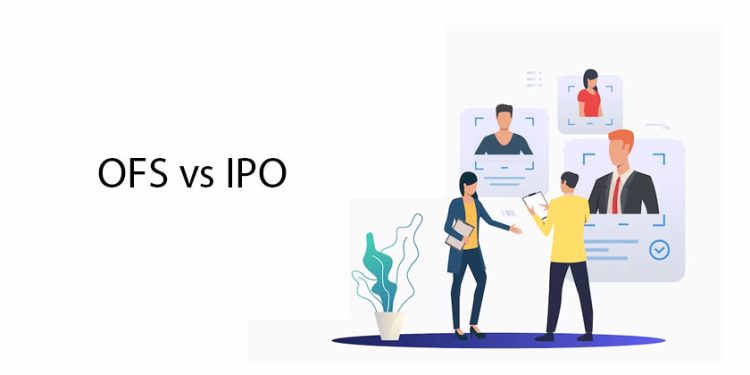Navigating the world of finance often involves exploring various methods through which companies raise capital to fuel their growth. Among these methods, two distinct avenues stand out: Offer For Sale (OFS) and Initial Public Offering (IPO) . While both OFS and IPO serve as mechanisms for companies to raise funds from the public, they differ in crucial aspects.
Topics Covered
- Offer for Sale (OFS)
- Initial Public Offering (IPO)
- What Are the Differences Between IPO and OFS?
- Invest Seamlessly with Religare Broking
Understanding the difference between IPO and OFS is essential for investors and businesses alike in making informed decisions regarding capital raising and investment strategies. This article delves into the disparities between OFS and IPO, shedding light on their unique characteristics and implications for investors.
Offer for Sale (OFS)
Unlike IPOs, an OFS is not used to raise fresh capital by selling shares. It is a way for existing stakeholders to sell their shares and make an exit. An OFS only helps with the transfer of ownership to a different investor. In some cases, an OFS might allow retail investors to buy the shares of a public company. Existing shareholders can liquidate their shares to institutional investors, retailers, mutual fund companies, insurance firms, and others with OFS.
Many companies combine an OFS with their IPOs to offer an exit to existing shareholders. Public entities listed on stock exchanges are allowed to come out with an OFS. SEBI asks companies to maintain a minimum of 25% of public shareholding. To meet the conditions, companies often launch an OFS and liquidate shares. OFS does not add to a company’s capital, as only a transfer of ownership occurs. Let us now discuss OFS vs IPO in detail.
Initial Public Offering (IPO)
An Initial Public Offering (IPO) marks the moment when a privately held company goes public by offering its shares to the general public on a stock exchange. This strategic move allows the company to access a larger pool of investors and raise capital for expansion, acquisitions, and other growth initiatives. IPOs provide an opportunity for early investors and employees to monetise their investments while also increasing the company’s visibility and credibility.
However, IPOs require significant regulatory compliance, transparency, and reporting, as the company is now accountable to shareholders. The IPO process involves underwriters who facilitate the offering, determine the initial share price, and market the shares to potential investors. It’s a transformative step that can lead to increased liquidity, heightened market exposure, and greater access to capital markets, but it also comes with heightened scrutiny and demands for consistent performance.
Invest in Upcoming IPOs – It All Starts with a Demat Account.
What Are the Differences Between IPO and OFS?
Now that you have understood the concept of IPO and OFS, it is time to discuss OFS vs IPO. Here is OFS vs IPO based on different parameters:
Motive
IPO marks the public transition of a company. It is also a source to raise fresh funding for a company. Companies can use the capital for expansion, R&D, or any other purpose. On the other hand, the motive of an OFS is to offer an exit to existing shareholders. Existing investors with more than 10% holdings can sell their shares to different investor(s). It only marks the transfer of holdings, and no fresh shares are issued.
Regulations
It is essential to understand the regulations for OFS and IPO. SEBI allows only the top 200 companies listed on stock exchanges to launch an OFS. Also, non-promoter shareholders with more than 10% holdings can apply for an OFS. When an OFS is launched, 25% of holdings are reserved for insurance and mutual funds companies. SEBI also asks companies to reserve a minimum of 10% shares of retailers in an OFS. Also, a company must notify the stock exchange two days before launching an OFS.
The rules and regulations for IPOs differ from that of an OFS. A company must seek permission from SEBI in advance to launch an IPO. A company can launch an IPO only after the approval of SEBI. Companies are required to disclose a prospectus containing IPO details. Around 35% of shares in an IPO are reserved for retail investors. Investors submit their IPO applications, and allotment of shares occurs after the closing day. Institutional investors also participate actively in IPOs.
Duration
IPOs last between three to ten days. Every IPO comes with a time duration for investors. Investors must submit their applications within the given IPO ationduration. On the other hand, an OFS might be finalised within a trading day. Existing shareholders can liquidate their holdings on stock exchanges. Investors can easily purchase liquidated shares on stock exchanges through a trading platform.
Costs Involved
The cost of an OFS is usually lower than an IPO. The existing shareholder bears the transaction cost for selling the shares or listing them on stock exchanges in an OFS. On the other hand, the company bears the cost of launching an IPO. The company must spend on underwriters to decide the market prices for shares. Not to forget, costs involved in launching different IPO documents. Companies also spend on advertising the upcoming IPO and attract more investors.
Invest Seamlessly with Religare Broking
Experience a seamless investment journey in IPOs or OFS with Religare Broking. Our user-friendly platform empowers you to participate in these opportunities effortlessly. Whether it’s an Initial Public Offering (IPO) or an Offer For Sale (OFS), our reliable services provide you with easy access to these investment avenues. Benefit from our expert insights, real-time updates, and comprehensive support to make informed decisions. Join us at Religare Broking and take advantage of a hassle-free way to invest in IPOs and OFS, unlocking your potential for financial growth.
In a Nutshell
Understanding the concept of OFS vs IPO for an investor is essential. IPOs allow companies to become public and raise fresh capital. On the other hand, an OFS allows existing shareholders to liquidate their holdings. The rules and regulations for both OFS and IPOs differ in India. Learn more about OFS vs IPO now!
Open Demat Account to investing in IPO

















